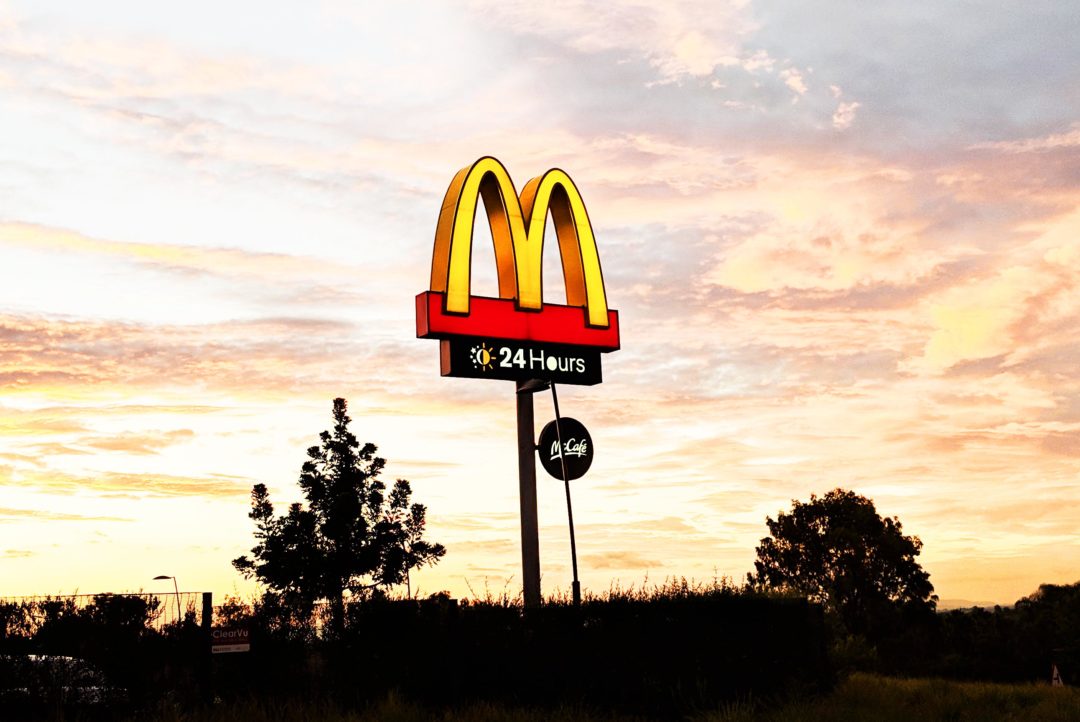For some reason, McDonald’s have been elected the ultimate supervillain on the food scene. When you say “(evil) fast food”, most people will think of McDonald’s. From ridiculous circulating articles claiming McDonald’s have genetically engineered a miraculous seven-breasted chicken monster to strangely conceived documentaries, McDonald’s seems to be getting a lot of flak. Is that fair, we ask?
We believe it isn’t, really. But it’s understandable. After all, McDonald’s is the most well-known fast food chain ever and because of that, it gets all the blame from the entire industry it so well represents.
There’s no discussion here that a nice, balanced, ideally organic home-made meal with lots of vegetables washed down with a jug of water is definitely better for you. It really is, and it should be the solid core of your everyday diet – it’s well worth the effort. But let’s get real, sometimes the moment is more than right for some nice fast food. So once you’ve gotten that choice out of the way, once you’ve decided you simply want some fast food and fast, what are the good things about choosing McDonald’s fast food?
There are two awesome things McDonald’s do that are keeping them at the peak of the fast food pyramid.
One is their invariable consistency. Wherever you go, the core remains the same. The methods for anything and everything are written down and enforced religiously, down to how you cut your tomatoes. Absolutely strict rules of hygiene are observed down to the dot. It is therefore difficult even for the most hardcore of McDonald’s haters to imagine that you could get food poisoning from old or improperly handled food at McDonald’s, or even suggest that there are different standards of food depending on who’s in charge of the kitchen on that particular day.
The second winning strategy is their flexibility, ability to predict and/or respond quickly to the changing times. They really keep an eye on the trends and manage to blend the working old with the well-chosen new – they keep bringing new ideas, keeping up with new trends and findings – be it in terms of interior design, introducing healthier options to the menu, automatically giving children fruits with their Happy Meal (in many countries), and addressing some of their environmental issues rather than playing possum – as many of their competitors do.
After a shower of abuse, they basically brought the idea of transparency into the fast food industry, introducing detailed information about each of their product and its content and history. They are putting more effort into recycling, sustainability (along with feed-sustainability) and animal welfare all down their supplier chain – for example the Filet-O-Fish sandwich has a certificate of sustainability from the Marine Stewardship Council, they’ve made a pledge to switch fully to cage-free eggs in the US and Canada by 2025. And that, additionally, serves as an example to other names in the fast food industry.
Over the years, the creative people of The Internet have come up with some very interesting urban legends, to this day believed by some. We’ve taken the liberty of taking a few and setting them straight.
- Are chicken nuggets made out of pink slime?
- Nope, it’s a mix of chicken breast, a proportionate bit of skin, spices and tempura. It does contain yeast extract, but that’s another story. Here is a video.
- Is McDonald’s cheeseburger so chemical and plastic-laden it can never rot?
- Nope, it doesn’t rot because there’s too little moisture for the spores to survive. The blog Serious Eats made home-made burger patties similar to McDonald’s and these also didn’t rot – because they also had too low moisture. The small McDonald’s patties just dry out quickly. It’s basically the age-old principle of the good old beef jerky. If you sealed the burger in a bag where the moisture couldn’t escape, they would probably rot. The same goes for their French fries.
- Is there horse meat in the burgers?
- Nope. There was a big horsemeat scandal in 2013 which implicated a great number of companies – but not McDonald’s. They have a strict control over their supply chain. Here’s what McDonald’s have to say about it.
- Is there ammonium hydroxide in beef?
- This was kind of true prior to 2011 when Jamie Oliver called a lot of attention to it. Ammonium hydroxide, per USDA, is a safe substance which is used in small concentrations to check bacterial growth on lean trimmings that are added to burgers. It was not an ingredient; it was a solution in which the meat was washed. This was a perfectly legal process that many food companies are using, but McDonald’s gave it up long ago.
- Do employees really spit in the burgers?
- Does this one even merit an answer?! Taking into account the fact that you cannot rule out hardcore sociopaths, a McDonald’s kitchen is very open-plan and everything is pretty visible. If this would happen at McDonald’s, it would be terminating offence and such an armpit of a person would be fired on the spot. McDonald’s take extreme pride in their strict standards and unbending methodology – which does not include spitting. The odds are very small, due to circumstances and rigorous control, and even smaller than elsewhere.
- Do they cut rain forests to feed the cattle?
- Weeeeell – this might be the case, in a roundabout way, though it is reportedly being handled. McDonald’s are using meat from local cattle in all the countries they are represented, but for instance in the UK, their beef supplier (Cargill) is feeding their cows with soy that possibly comes from areas of deforestation in Brazil and Bolivia. Cargill had signed a pledge to end deforestation earlier and claims this particular instance occurred outside of their control. They promised to investigate and end cooperation with any farmers burning down forests. This information is from the year 2017.
- McDonald’s pledged themselves (and they claim to have been the first in the fast food industry) to eliminate any links to deforestation in their products. This includes their packaging, coffee and any palm oil they use. Due to the sometimes unclear chain of suppliers, this might be a challenge, but one they have promised to meet.
- Does Mc Donald’s use GMOs (in Europe)?
- No, that would be illegal – here’s what Wikipedia says about GMOs and Europe: “…EU law also requires that all GM food be traceable to its origin, and that all food with GM content greater than 0.9% be labelled.[34].” McDonald’s (UK) also answers this question here.
- Does McDonald’s food contain ingredients that get you hooked?
- This is more a question for the entire food industry. Like many, many restaurants and food producers, McDonald’s uses yeast extract, an ingredient which creates savory flavor and umami taste. In the US, they are also adding hydrolyzed wheat and milk proteins – it’s called natural beef flavor because it has umami taste and contains glutamic acid. Sodium salt of glutamic acid is well known as monosodium glutamate or MSG.
- Do McDonald’s use earthworms in the burger meat?
- They’d be a bit stupid to do so as worms are more expensive than the beef they are using, so no.
- Are McDonald’s using potatoes so toxic, farmers need to stay away from them for 5 days before approaching them to ship them off for processing?
- Well, that’s actually a totally standard practice in any potatoes you’re using, whether you get them in a restaurant or in a supermarket, so again, this is not a McDonald’s problem, but an issue of the whole food industry. Going organic or choosing a local farmer who demonstrably avoids pesticides is the only way if this is worrying you.
All in all, taken in moderation and balanced out with good, healthy eating, enjoying a nice, juicy Big Mac on a trip once in a while should not result in you sprouting an extra limb or give you instant dementia. We are in no way advocating fast food as a full-on diet, but taken as an occasional exception in a solid regime of healthy eating, we hope you will enjoy the taste without undue feelings of guilty expectations of doom – that’s actually way more unhealthy for you than the simple content of that one McMeal. Bon appetit!




